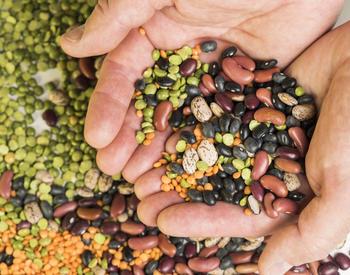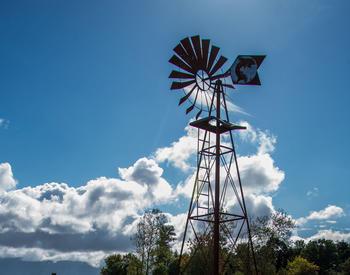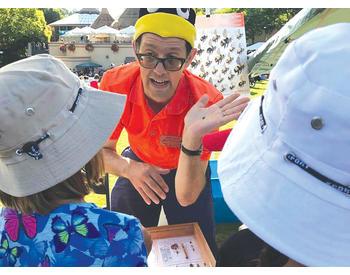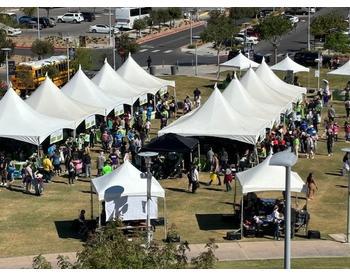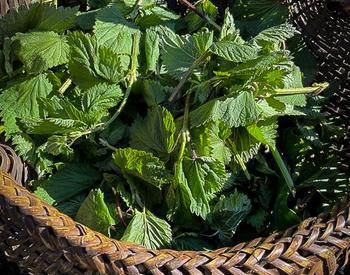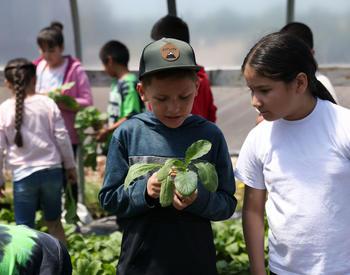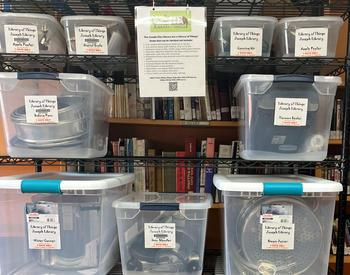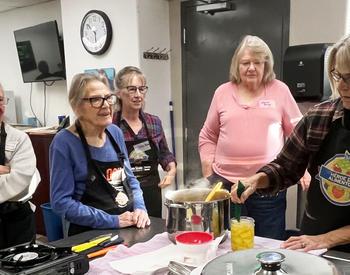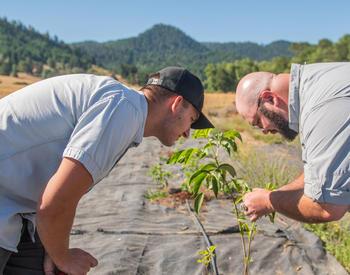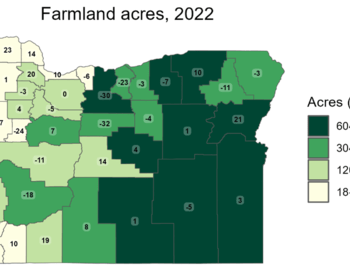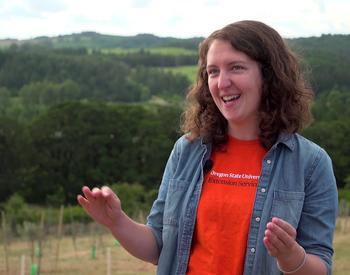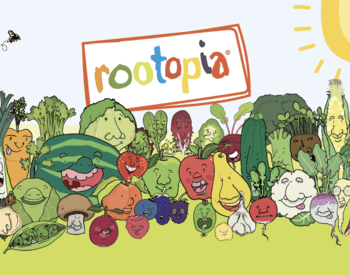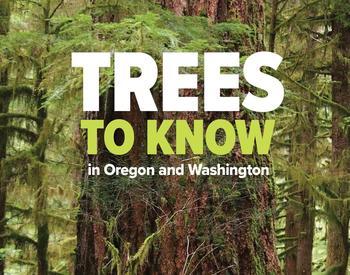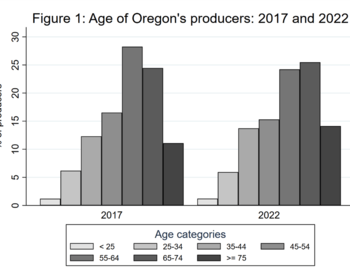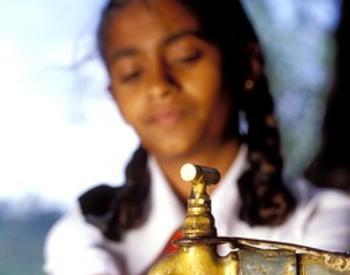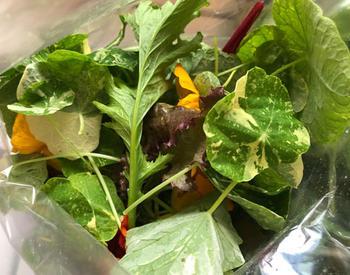Transcript
Our current pandemic has given us the beauty of time. Time at home, time with our families, and time to tackle some of our big problems magnified by our current state of affairs. It has also given us time to think about projects in the works, so to speak, and elevate their urgency. It's exactly this need, an urgency that has established the Boardman Food Pantry, but like most projects it didn't start this way. There's a quote from Harriet Beecher Stowe that says, “never give up, for that is just the place and time the tide will turn.” This is a lesson that I’ve lived and embraced the past nine months and have witnessed the miracle of community engagement.
I can imagine nothing worse than an empty refrigerator and empty shelves and not being able to feed my children. Unfortunately, during this pandemic and long before, this was a challenge for many Boardman families. Boardman is my home and also home to 4000 other residents on the bank of the Columbia River in North Morrow County. Agriculture and food processing are local economic drivers, with the new data storage and processing running close behind. We are the county with one of the lowest unemployment rates and one of the highest median incomes in the state. Yet, our local schools boast a 100% free and reduced lunch rate, and many local families struggle with food insecurity.
How do we know this? In the Fall of 2018 my colleague working in SNAP, Angie Treadwell, invited me to work on a project in a planning committee working on a FEAST grant for the Boardman community. FEAST is a small grant program sponsored by the Oregon Food Bank that provides funds to communities to hold small events and discussions about food. After the discussion, the group uses a small grant, in our case about $4,000 on a small project. In April of 2019, I helped facilitate our local discussion and FEAST event. This event was held in both English and Spanish with mostly Spanish-speaking participants. The community discussion brought to light local food insecurity and under-utilization of the local emergency food pantry.
The nearest food pantry is located 13 miles away in the community of Irrigon and is only open on Wednesdays from 1 to 3 pm. Families admitted if they had to make the choice between buying fuel for their car to go to work, or going to the food pantry, they were going to go to work. The distance and time barriers made this a really under-utilized resource. It's here that the pantry discussion initially began. Like many other ideas there were lots of engaged and excited people. However, four people showed up to the first meeting, two of them being OSU employees. So this was the case for month after month, meeting after meeting. Committee members changed, they left, they became completely disengaged. The committee really landed on this idea about having a food pantry in Boardman, but no one was really interested in taking the lead. There were naysayers in the group saying that non-profits were too difficult to set up, and that we would never have enough money to be sustainable and keep feeding people.
In February of this year the committee was pretty much ready to throw in the towel and give the remaining funds back to the Oregon Food Bank. Then march came, and a lockdown in place. A local church began providing emergency food about week two of the lockdown. There was a large need, some donations and a few funds. The previous committee members rallied to get permission from the Oregon Food Bank to use the remaining FEAST funds to purchase food for distribution. Then small donations started to roll in. First fifty dollars, then a hundred dollars, then several businesses wanted to donate cheese. A lot of cheese. And potatoes and French fries. And a lot of potatoes and french fries.
The pantry had funds and food, and little storage. Then, businesses wanted to give bigger and someone suggested we apply for a grant. These are the things that happen with extra time, and a large need. A small community of excited and engaged people met via Zoom in late March. We helped promote and convene an open community meeting via Zoom the following month. We had 42 people show up online. Businesses, educators, social services, the church community, the chamber of commerce director, and other volunteers committed to giving back and seeing this through. A board was established, additional meetings were held, bank accounts were opened, non-profit paperwork filed with the state. The donations really started to roll in. The pantry purchased a small refrigerator and freezer, all the while with a small group of volunteers working every week twice a week to hand out food boxes.
The stories of help and heartache from the families being served are many. A local elderly couple had been living on only a large bag of oatmeal until their first food box arrived. Another family with small children was excited to receive a box with cold cereal and tortillas. On May 30th our community suffered the wrath of a large windstorm that knocked out power and water, and devastated communities including a trailer park. The food pantry was able to contact the Oregon Food Bank and receive an emergency donation of 120 food boxes and three pallets of food to distribute to the community and those affected by the devastation. This only furthered the work of the volunteers in the newly formed board. It also caught the attention of county commissioners. County commissioners pledged and appropriated $100,000 of CARES Act funds to the Boardman Food Pantry. This was significant and fueled our outreach for additional funds.
We engaged partners and board members to reach out to businesses and some small local grants. I'm always amazed by what people are willing to give, especially if you ask them. Through these business partnerships, virtual meetings, and assistance from the Association of Oregon Counties, the Boardman Chamber of Commerce, and countless dedicated individuals, since May 1st, the Boardman Food Pantry has received in excess of $300,000. I can't help but think that maybe all the right people were in the right place at the right time, and there was maybe also some divine intervention. As a result of this amazing outpouring of support, the Boardman Food Pantry has been able to purchase a vacant building in town, paying in full.
In addition, they have commitments from local businesses and industry for annual long-term support. Knowing that families will continue to benefit in the long run is really quite amazing. I can't help but circle back to the Harriet Beecher Stowe quote and the lesson there, not just for our food pantry, but Extension in general. "Never give up, for that is just the place and time that the tide will turn." If we have all learned any lessons during this remarkable year... It's just that. Don't be afraid to stick it out until the tide turns for that's truly when the magic can happen.
Just when you thought that program was dead in the water and you wondered how you would finish that final grant write up....boom! Catastrophe strikes just in time to engage its revival. The story of the establishment of the Boardman Food Pantry was a tale such as this.
An initial grant was received, event took place, committee formed, meetings completed, committee died. This is a tale that happens sometimes with projects that have the best of intentions but just don’t come together.
However, sometimes it takes a small crisis, in the form of a global pandemic, to reinvigorate committees, engage new partners and find a way from dead in the water to $60,000 in donations in five months. Come listen to this familiar tale, with a not so familiar ending.
